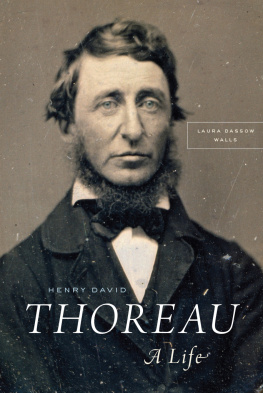Black Walden
Copyright 2009 Elise Lemire
All rights reserved. Except for brief quotations used for purposes of review or scholarly citation, none of this book may be reproduced in any form by any means without written permission from the publisher.
Published by
University of Pennsylvania Press
Philadelphia, Pennsylvania 19104-4112
Printed in the United States of America on acid-free paper
10 9 8 7 6 5 4 3 2 1
Library of Congress Cataloging-in-Publication Data
Lemire, Elise.
Black Walden : slavery and its aftermath in Concord, Massachusetts/Elise Lemire.
p. cm.
Includes bibliographical references and index.
ISBN 978-0-8122-4180-8 (alk. paper)
1. SlaveryMassachusettsConcordHistory. 2. SlavesMassachusettsConcordSocial conditions. 3. Concord (Mass.)Social conditions18th century. 4. Thoreau, Henry David, 18171862. Walden I. Title.
F74.C8L46 2009
974.4'4--dc22
2009001010
For my parents,
Robert and Virginia LemireEAST OF MY BEAN-FIELD, across the road, lived Cato Ingraham, slave of Duncan Ingraham, Esquire, gentleman of Concord village; who built his slave a house, and gave him permission to live in Walden Woods;Cato, not Uticensis, but Concordiensis. Some say that he was a Guinea Negro. There are a few who remember his little patch among the walnuts, which he let grow up till he should be old and need them; but a younger and whiter speculator got them at last. He too, however, occupies an equally narrow house at present. Catos half-obliterated cellar hole still remains, though known to few, being concealed from the traveller by a fringe of pines. It is now filled with the smooth sumach ( Rhus glabra, ) and one of the earliest species of golden-rod ( Solidago stricta ) grows there luxuriantly.
Here, by the very corner of my field, still nearer to town, Zilpha, a colored woman, had her little house, where she spun linen for the townsfolk, making the Walden Woods ring with her shrill singing, for she had a loud and notable voice. At length, in the war of 1812, her dwelling was set on fire by English soldiers, prisoners on parole, when she was away, and her cat and dog and hens were all burned up together. She led a hard life, and somewhat inhumane. One old frequenter of these woods remembers, that as he passed her house one noon he heard her muttering to herself over her gurgling pot,Ye are all bones, bones! I have seen bricks amid the oak copse there.
Down the road, on the right hand, on Bristers Hill, lived Brister Freeman, a handy Negro, slave of Squire Cummings once,there where grow still the apple-trees which Brister planted and tended; large old trees now, but their fruit still wild and ciderish to my taste. Not long since I read his epitaph in the old Lincoln burying-ground, a little on one side, near the unmarked graves of some British grenadiers who fell in the retreat from Concord,where he is styled Sippio Brister,Scipio Africanus he had some title to be called,a man of color as if he were discolored. It also told me, with staring emphasis, when he died; which was but an indirect way of informing me that he ever lived. With him dwelt Fenda, his hospitable wife, who told fortunes, yet pleasantly,large, round, and black, blacker than any of the children of night, such a dusky orb as never rose on Concord before or since.
HENRY DAVID THOREAU, Walden (1854)
CONTENTS
INTRODUCTION
The Memory of These Human Inhabitants
E ACH YEAR, HALF A MILLION PEOPLE visit Walden Pond in Concord, Massachusetts. Most come to pay homage to Henry David Thoreau, who for two years lived a quiet, contemplative life in a small cabin he built not far from the ponds shores. And yet in Walden; or, Life in the Woods (1854), his famous account of his experiment in subsistence living, Thoreau asks us to experience the Walden landscape as a rich repository of a long and complicated human history that began well before his arrival in 1845. He devotes the better part of a chapter to a community of former Concord slaves who lived not far from his cabin during the first four decades of the new nations existence. Their experiences after emancipation were one reason Thoreau was drawn to live in Walden Woods himself. He regarded the former slaves persistence in the face of isolation and harassment as heroic, and like them he sought to live independently. He also enjoyed living in a part of town where, because of its past association with former slaves and other outcasts, few of his white contemporaries chose to linger.
Mary Minot was one of those people who avoided Walden Woods when she could. Her story, which Thoreau uses in Walden , is a good place to start a book that investigates the long-forgotten connection between Walden Woods and Concords slave history. Mary was born in Concord six years after her father Ephraim fought the British at Concords North Bridge in 1775. While her father could say he helped set in motion one of the great political revolutions in western history, Mary led a relatively quiet life. She never married and lived with her younger brother George and her business partner, Elizabeth Potter, in an unpainted, four-room cottage. George Minot, who also never married, spent his days farming and fishing, rarely venturing from the town
Years later, George Minot told Thoreau about a particular August day Mary spent in Lincoln sewing for their sister. After hours spent bent over her needle, Mary attempted to carry home what her brother told Thoreau was the rather onerous present of a watermelon, prompting Thoreau to recall in his journal the old saying that a person cannot carry two melons under one arm and to note that it is difficult to carry one far, it is so slippery. Mary was seventy-eight when Thoreau recounted her attempt in an 1859 journal entry. The day she set off through Walden Woods with a heavy watermelon in her arms must have taken place years earlier, probably in the 1820s or 1830s when Lavinas children were growing fast and their wardrobes thus in constant need of attention. Mary, then in her forties or fifties, set out holding the tricky fruit as best she could, eager to share this favorite summer treat with her brother and Miss Potter. Called the Great County Road in its heyday, the road she followed is known today as Walden Street or Route 126. The stagecoach used to rumble along this way, as did numerous farmers wagons and rich mens chaises, all conveying goods and people either north to New Hampshire or east to Boston via its connection to the mainland at Roxbury Neck. But since the completion of a bridge that connected Charlestown to Boston in 1785, the majority of traffic ran farther to the east along the Lexington road, formerly called the Bay road, which
On this particular day, however, the farmers who normally filled the woods with the ringing of their axes must have been celebrating the end of haying season with their annual fishing trip to Dorchester. And although Mary sometimes brought her partner with her to Lincoln, she had made this visit alone. There was no one to help carry the watermelon or any of the other items Mary toted. Nor was there anyone to keep her company as the silence closed in around her. All she could hear were the whispering of the pines Thoreau described as so close to the road they would scrape both sides of a chaise at once.
As Thoreau well knew and as he points out in his journal on the occasion of reporting what happened next, Walden Woods had a rather bad reputation for goblins and so on in those days. As a young child, he had heard reports from other children about an Indian doctor living there who caught small boys and cut out their livers to make medicine. More recently, Marys brother George had told him of once hearing a colored woman somewhat witch-like, mutter something like an incantation over the contents of a cauldron she was stirring in a small hut in Walden Woods. Ye are all bones, bones! she cackled in what George described as a shrill voice. Thoreau had heard too of a large, round, and black fortune-teller who had lived just down the road from the witch. Having presumably heard these same stories from her brother or other locals, Mary became anxious as she approached the remnants of the dwellings in which these notorious characters once lived. The watermelon, Thoreau notes, did not grow any lighter, though frequently shifted from arm to arm. Quickening her pace, Mary failed to keep her grip on the slippery melon. It smashed to pieces in the middle of the Walden road. Thoreau muses only half seriously that the accident might have been caused by one of those mischievous goblins. Certainly Mary thought so. Her brother reported to Thoreau that, trembling, she stopped only to gather the choicest pieces of fruit in her handkerchief before she flew rather than ran with them to the peaceful streets of Concord. In Walden, Thoreau draws on Marys experience of the Walden road, writing that women and children who were compelled to go this way to Lincoln alone and on foot did it with fear, and often ran a good part of the distance.











